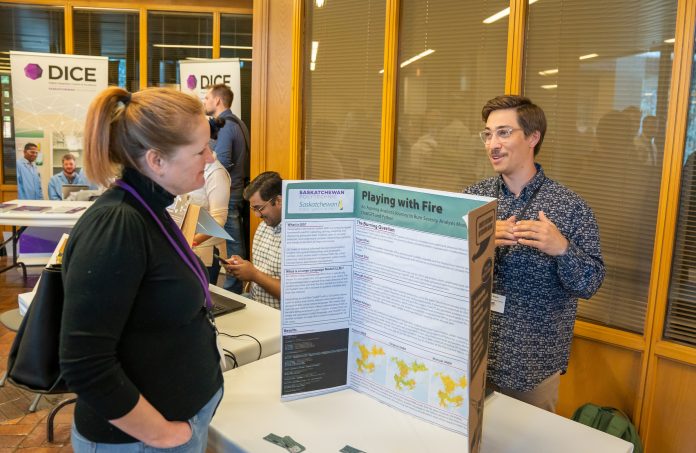
Anthony Ihekuna, Sask Polytech Business Student
With a passion for technology and a thirst for knowledge, Shai Bravo has carved a unique education journey that has led him from university classrooms to Saskatchewan Polytechnic labs to become a Geographic Information Science (GIS) technician with the City of Prince Albert.
His inspiring journey showcases the transformative power of post-secondary education and the endless possibilities in the field of GIS.
After completing his USask commerce degree, Bravo utilized his marketing skills in graphic design, video editing and sports marketing, working for a coffee shop, Huskie Athletics at USask and the City of Ottawa. When Bravo was ready for a change, he returned home to Prince Albert with his girlfriend where he opened a coffee shop.
After a year of soul searching, Bravo decided to close the coffee shop and reskill for a new career. He learned about Sask Polytech’s Geographic Information Science (GIS) certificate program and applied. This one-year program changed the trajectory of his career.
“So many things hit the checkmark for my soul, the integration of technology and the ability to use digital data to solve difficult problems made me excited about a GIS career,” Bravo said.
GIS is a relatively new field that uses computer technology to link maps to digital data, helping resource managers and urban planners make better, more informed decisions. For Bravo, the course was a natural fit, driven by his love for technology, personal improvement and interest in solving complex digital problems through data interpretation and artificial intelligence (AI).
“Shai had a profound interest in learning new technology,” GIS instructor Ryan Galbraith said. “During his studies he used ChatGPT to his advantage by automating tasks and arriving at unique solutions for class projects.”
Amid his program, Bravo completed an applied research project, aligning it with his interest in AI and GIS. Collaborating with the Saskatchewan Public Safety Agency (SPSA), he created a fire burn severity map for the applied research student showcase.
“Integrating ChatGPT with a GIS system can make geospatial data more accessible and usable for a wider range of users, helping to democratize access to information and insights from geospatial data,” Bravo said.
Using AI and publicly available satellite imagery, Bravo was able to identify errors on mapped out perimeters by plugging it into the system. This resulted in impressive and nearly perfect results.
“The whole applied research process was a fun learning experience and pushed me to my limits,” he said.
Now employed as a GIS technician with the City of Prince Albert, Bravo credits Sask Polytech’s applied research opportunities with preparing him for his new career.
“My applied research project helped prepare me for the GIS work I’m now doing. It gave me great work experience and I was able to connect with and get advice from GIS experts,” he explained.
According to Galbraith, there are lots of job opportunities in GIS and the program has a high employment rate, with 100 per cent of students finding a job within 12 months of graduation. GIS skills are applicable in any organization that maintains assets in the environment. Graduates work with mining companies, utility companies, First Nations, urban and rural municipalities, and health care agencies, to maintain information with geospatial reference.
Looking ahead, Bravo is eager to continue honing his skills and embracing new challenges in the dynamic GIS field.
“Working as a GIS technician, you’re constantly learning new things and growing your knowledge. The field is vast and still gaining traction with the advent of AI,” he said.
Offering advice to perspective and current students, Bravo encourages them to trust their gut and take the leap to continue learning.
“Don’t worry about the logistics of how things will happen, take the steps of pursuing what you love and everything else will fall into place,” he said. “Sask Polytech and it’s applied research opportunities provide students access to real-world scenarios, equipping them with the tools, expertise and support necessary to confront challenges and pave the way for their future careers.”
Bravo exemplifies the spirit of Sask Polytech, where mature students can take unconventional paths to find their dream career. Learn more about Sask Polytech’s Geographic Information Science (GIS) program at saskpolytech.ca.

